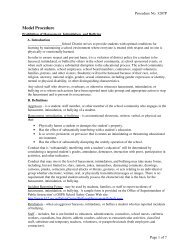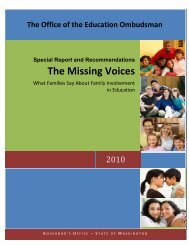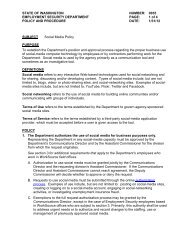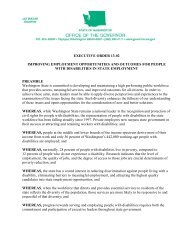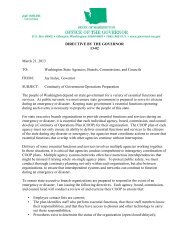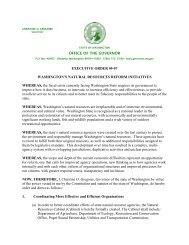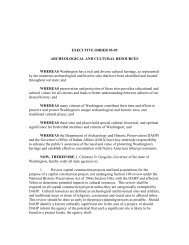Board policies (PDF) - Governor
Board policies (PDF) - Governor
Board policies (PDF) - Governor
Create successful ePaper yourself
Turn your PDF publications into a flip-book with our unique Google optimized e-Paper software.
vote and may explain his or her reasons for the recommendation. Petitioners and interested<br />
parties should not interrupt the deliberations process, but may answer any additional questions<br />
that the <strong>Board</strong> raises during its deliberations.<br />
After the <strong>Board</strong> has reached a decision, the Chairperson announces it and closes the <strong>Board</strong>’s<br />
record on the Petition. The recommendation is submitted to the <strong>Governor</strong>, who is not bound to<br />
follow the <strong>Board</strong>’s recommendation or take any action on the Petition.<br />
IV.<br />
ANNUAL CALENDAR FOR PROCESSING PETITIONS<br />
<strong>Board</strong> hearings are scheduled quarterly in the months of March, June, September and December,<br />
generally on the second Friday of the month.<br />
V. BOARD MEMBER’S IMPARTIALITY<br />
In order to maintain a clemency and pardons system that openly and objectively evaluates<br />
petitions before recommendations are made to the governor, a board member will not discuss a<br />
petition pending before the <strong>Board</strong>, or a matter anticipated to be presented to the <strong>Board</strong>, with<br />
anyone outside of the quarterly hearings. Please do not contact a member of the <strong>Board</strong> about a<br />
petition.<br />
<strong>Board</strong> members shall be impartial and make their recommendations solely on the record<br />
presented to them through the process established by the <strong>Board</strong>. <strong>Board</strong> members are required to<br />
disclose any real or perceived conflicts of interest or ex parte communication and shall disclose<br />
any such conflicts or communications on the record at the hearing. For purposes of this section,<br />
the term “ex parte” shall mean where, without notice, one or more interested parties is not<br />
present to participate in the communication.<br />
After disclosing a real or perceived conflict or ex parte communication, a <strong>Board</strong> member may<br />
either choose to recuse him/herself or may choose to continue in the proceeding if the <strong>Board</strong><br />
member believes he or she can exercise his or her statutory duty in a fair, impartial, and objective<br />
manner. Such recusal is an act taken by a <strong>Board</strong> Member of his or her own volition.<br />
VI.<br />
DISCRETIONARY POWERS OF THE BOARD<br />
Nothing in these Policies is intended or should be construed to limit the <strong>Board</strong>’s statutory<br />
authority to consider, hear, or make a recommendation to the <strong>Governor</strong> to grant or deny a<br />
Petition for pardon, commutation or restoration of rights.<br />
VII.<br />
AMENDMENTS TO THE POLICIES<br />
By majority vote, with a quorum present, the <strong>Board</strong> may adopt, amend, or repeal these <strong>policies</strong> at<br />
anytime it deems appropriate. Minor clerical changes may be made at the direction of the<br />
Chairperson without a vote of the <strong>Board</strong>.<br />
5







